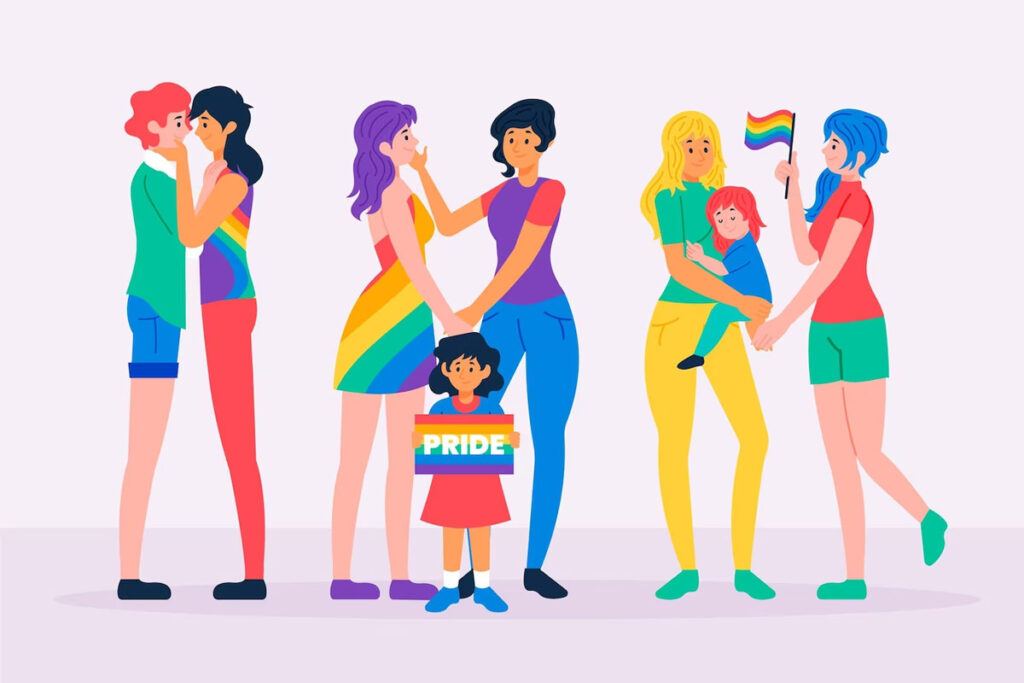Navigating the world of mental health care can be challenging, especially when you’re looking for a therapist who understands and affirms your identity while also accepting Medicaid. This guide is designed to help LGBTQIA+ individuals, their loved ones, and advocates find the right mental health support. Let’s explore a step-by-step approach to connecting with LGBTQIA+-friendly therapists who accept Medicaid.
Why Finding the Right Therapist Matters
For LGBTQIA+ individuals, having a therapist who understands and respects your identity is crucial. A therapist who is knowledgeable about LGBTQIA+ issues can provide more effective and affirming care, addressing the unique challenges you may face. Combining this with Medicaid acceptance ensures that financial constraints don’t prevent you from accessing the mental health support you need and deserve.
6 Steps to Find LGBTQIA+-Friendly Medicaid Therapists
1. Research Medicaid Coverage in Your Area
Start by understanding your Medicaid coverage. Each state has different rules and coverage options:
– Visit your state’s Medicaid website
– Call the Medicaid helpline for specific information about mental health coverage
– Check if your state has expanded Medicaid, which may offer more comprehensive mental health services
-Feel free to call our office for any questions. We can help you find the information to get you connected to the therapist you need.
2. Use LGBTQIA+-Specific Directories
Several organizations maintain directories of LGBTQIA+-friendly healthcare providers:
– The Gay and Lesbian Medical Association (GLMA) provider directory
– National Queer and Trans Therapists of Color Network
– Psychology Today’s therapist finder (use filters for LGBTQIA+ and Medicaid)
Curious about navigating open relationships? Check out our in-depth guide on LGBTQIA+ couples therapy and open relationships.
3. Leverage Community Resources
Local LGBTQIA+ community centers often have lists of affirming healthcare providers:
– Contact nearby LGBTQIA+ centers for recommendations
– Join local LGBTQIA+ support groups and ask for therapist referrals
– Reach out to PFLAG chapters in your area for guidance
4. Understand the Limitations of Online Therapy Platforms
At the time of writing, many of the well-known online therapy platforms, such as Talkspace and BetterHelp, do not accept Medicaid. This can be frustrating for those seeking the convenience of online therapy combined with Medicaid coverage. However, don’t be discouraged—there are still ways to access the care you need.
Here are some alternatives to consider:
- Check Your State’s Medicaid Telehealth Coverage: Some state Medicaid programs do cover telehealth services. It’s worth researching if your state’s Medicaid plan includes online therapy options through local providers.
- Seek Local Providers Offering Telehealth: Many local mental health clinics and LGBTQIA+-friendly therapists offer telehealth sessions. Contact them directly to inquire if they accept Medicaid and if they can provide virtual appointments.
- Explore Community Health Centers: Federally qualified health centers (FQHCs) often provide mental health services and may offer telehealth options, many of which accept Medicaid.
While the big online platforms might not be an option, these alternatives can still help you find accessible, affirming mental health care through Medicaid.
5. Contact Local Mental Health Clinics
Many community mental health clinics accept Medicaid and have diverse staff:
– Call clinics directly to ask about LGBTQIA+-friendly therapists
– Inquire about staff training in LGBTQIA+ issues
– Ask if they offer specialized programs for the LGBTQIA+ community
6. Verify and Interview Potential Therapists
Once you have a list of potential therapists:
– Confirm they accept your specific Medicaid plan
– Schedule brief consultations to assess their experience with LGBTQIA+ clients
– Ask about their approach to LGBTQIA+-specific issues
– Trust your instincts – it’s okay to keep looking if you don’t feel comfortable

Overcoming Common Challenges
Finding the right therapist may take time and persistence. Here are some tips for overcoming common obstacles:
– Limited options: If local options are scarce, consider telehealth services that may give you access to therapists in other parts of your state.
– Long wait times: Get on multiple waiting lists and follow up regularly. Cancel other appointments once you secure one.
– Lack of specialization: If you can’t find a therapist specializing in LGBTQIA+ issues, look for those open to learning and who demonstrate a respectful, affirming attitude.
Interviewing Potential Therapists: Key Questions to Ask
When you’ve found potential therapists, it’s crucial to ask the right questions during your initial consultation. Here’s a detailed list of questions to help you assess their experience, approach, and familiarity with LGBTQIA+ issues:
- What is your experience working with LGBTQIA+ clients?
- Have you received specific training on LGBTQIA+ issues and mental health?
- How do you approach topics like gender identity, sexual orientation, and coming out in therapy?
- Are you familiar with the specific challenges faced by transgender, non-binary, asexual individuals?
- How do you stay informed about current LGBTQIA+ issues and best practices in therapy?
- What is your stance on conversion therapy? (Note: Ethical therapists should strongly oppose this practice)
- How do you address internalized homophobia or transphobia in therapy?
- Are you experienced in helping clients navigate family and relationship issues specific to LGBTQIA+ individuals?
- How do you approach topics of spirituality or religion as they relate to LGBTQIA+ identity?
- What is your experience with hormone therapy and gender-affirming care, if applicable?
Remember, a good therapist should be open to these questions and provide clear, respectful answers.
Schedule your Free 15 Minute Consultation today.
Finding Therapists Who Understand Intersectional Identities
Many LGBTQIA+ individuals also hold other marginalized identities, making it crucial to find a therapist who understands intersectionality. Here are some tips:
- Specify Your Needs: When searching directories or contacting counseling practices, be specific about your intersecting identities (e.g., “Black transgender woman” or “disabled gay man”).
- Look for Specialized Networks: Seek out organizations that focus on specific intersections, such as:
- The National Queer and Trans Therapists of Color Network
- LGBTQ Psychotherapists of Color Directory
- Therapy for Latinx
- Asian Mental Health Collective
- Ask About Cultural Competence: During consultations, inquire about the therapist’s experience and approach to working with clients who share your intersecting identities.
- Seek Therapists with Lived Experience: While not necessary, some clients find it helpful to work with therapists who share some of their identities.
- Discuss Socioeconomic Factors: Ensure the therapist understands how factors like education, class, and economic status intersect with your LGBTQIA+ identity.
For those seeking comprehensive, intersectional care, consider iAmClinic. Here’s why iAmClinic stands out:
- Inclusive and Affirming: iAmClinic is dedicated to providing a safe and affirming environment for all LGBTQIA+ individuals, regardless of their intersecting identities.
- Experienced Therapists: Our therapists are well-versed in handling a variety of intersectional identities and understand the unique challenges faced by individuals who navigate multiple marginalized identities.
- Cultural Competence: iAmClinic prioritizes cultural competence, ensuring that our therapists are not only trained but also continuously educated on issues affecting diverse communities.
- Lived Experience: Many of our therapists share lived experiences with their clients, fostering a deeper understanding and connection.
- Holistic Approach: We recognize the importance of addressing socioeconomic factors and incorporate this understanding into our therapeutic practices.
- Accessible Care: We offer services through both in-person and telehealth platforms, ensuring accessibility regardless of your location.
By choosing iAmClinic, you are opting for a therapy provider that prioritizes understanding and affirming your full, authentic self. Our commitment to intersectional care means you can trust that your therapist will be equipped to support all facets of your identity. Schedule a free consultation NOW!
Addressing Common Concerns and Questions
- Confidentiality:
- Therapists are bound by strict confidentiality laws.
- Ask about their confidentiality policy, including any legal limitations.
- Discuss how they handle electronic records and communication.
- Feeling Uncomfortable:
- It’s normal to feel nervous at first, but persistent discomfort might indicate a poor fit.
- Trust your instincts. If you feel consistently uncomfortable, it’s okay to look for another therapist.
- Discuss your feelings with your therapist; a good therapist will be open to this conversation.
- Changing Therapists:
- You have the right to change therapists at any time.
- You don’t need to provide a reason, but feedback can be helpful.
- Ask your current therapist or insurance provider about the process of transferring to a new therapist.
- Insurance and Payments:
- Confirm that the therapist accepts your specific Medicaid plan before starting sessions.
- Ask about any potential out-of-pocket costs.
- Inquire about the therapist’s policy on missed or canceled sessions.
- Therapy Approach:
- Ask about the therapist’s treatment approach and how it applies to LGBTQIA+ issues.
- Discuss typical session structure and frequency.
- Inquire about goal-setting and how progress is measured.
- Crisis Support:
- Ask what support is available between sessions or during crises.
- Get information on local LGBTQIA+-friendly crisis resources.
Remember, finding the right therapist may take time, but it’s a crucial step in your mental health journey. Don’t hesitate to advocate for your needs and keep searching until you find a therapist who respects your identities and can provide the support you need.

Conclusion
Remember, you deserve mental health care that respects and affirms your identity. By following these steps and utilizing available resources, you can find an LGBTQIA+-friendly therapist who accepts Medicaid. Your mental health journey is important, and finding the right support is a crucial first step towards well-being.
Don’t give up if the process seems challenging at first. With persistence and these strategies, you can connect with a therapist who understands your needs and can provide the support you’re looking for. Your mental health matters, and there are professionals ready to support you on your journey.


